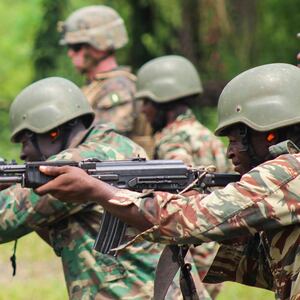UYO, Nigeria—The U.S. State Department announced in early February it was halting some military assistance to Cameroon—terminating a C-130 aircraft training program, stopping deliveries of four Defender patrol boats and nine armored vehicles, and terminating the upgrade of a Cessna surveillance aircraft for the notorious Rapid Intervention Battalion, known as by the French acronym BIR. The reason: allegations of gross human rights violations by Cameroon’s armed forces in the western and far northern regions of the country.
Over the last five years, the U.S. gave more than $220 million to Cameroon in security assistance—including $700,000 spent this year already under the rubric “international military education and training.”
Much of the U.S. assistance to the nation at the center of the African continent has gone to the BIR, an elite military force. In 2016 the American ambassador to Cameroon heaped effusive praise on the unit. “In their training, conduct, and leadership, the BIR exhibited all of the values we expect in our own armed forces—professionalism, protection of the civilian population, and respect for human rights.”
ADVERTISEMENT
But international human rights organizations were compiling records of shocking brutality toward civilians not only in their war against the Al Qaeda linked terrorists of Boko Haram–the reason for U.S. support–but in actions specifically against gay men.
In general, Cameroon is considered to be one of the most dangerous places in the world for LGBTQ people. You can be jailed for putting on the wrong clothes or throwing a smile at the wrong person. Under the law, anyone caught in a public or private homosexual relationship is punished with a sentence of six months to five years in prison and a fine.
But when soldiers from the BIR attack gays, they are doing so outside the law.
As reported by the international advocacy group Erasing 76 Crimes, which focuses on abuses in more than 70 countries that have anti-LGBTI laws, Cameroonian soldiers have worked undercover in a bid to arrest homosexuals, and military officials conduct anal examinations on suspects in the belief they can thus detect signs of homosexual activity.
There are also reports of arrests and torture of suspected gay persons in military facilities, trials of suspected homosexuals in military courts, and at least one incident wherea gay man was shot by a gang of BIR soldiers who attacked a bar after one of their group allegedly had his phone stolen.
In early 2017, Hassan Ahmed, a young Nigerian national, was standing around near a mini market in the far north Cameroonian town of Fotokol waiting to buy foodstuffs when he placed his right hand on the shoulder of a close friend who was with him. Two soldiers arrived and accused the boys of being gay, then dragged them away from the shop into a nearby building where they were beaten up and ordered to confess that they were in a same-sex relationship.
When the boys insisted that they weren't homosexuals, the soldiers, whom Ahmed suspected were from the BIR, ordered them to take off their pants and then carried out forced anal examinations on them, claiming (erroneously) that they could tell by that if they were truly gay.
“When they saw nothing to prove that we were gay, they let us go,” Ahmed told The Daily Beast in the northeastern Nigeria town of Maiduguri where he now resides.
“It was indeed a painful and humiliating experience,” Ahmed said.
It appears Ahmed and his friend were not the only ones in Fotokol accused and brutalized by the BIR as alleged homosexuals. According to the Ahmed, soldiers often rounded up boys whom they saw meeting in groups and accused them of being members of the Boko Haram sect–or of being homosexuals.
“This happens often, and I know of four boys who were attacked by soldiers while they were meeting to discuss a project,” Ahmed said. “If you're lucky, they'll only beat you up and then set you free, but, in most cases, suspects are taken to a detention center located in a primary school.”
The BIR runs an unofficial lock-up in a Fotokol school where individuals are detained and tortured and tortured “off the grid.” According to a 2017 report by Amnesty International on Cameroon’s secret torture chambers, “The BIR began using the Public School number 2 of Fotokol in May 2014. While the school was not being used by children due to the hostilities between Cameroon and Boko Haram, it did re-open in November 2016. The school was still partially used by the BIR as of June 2017, with detainees held there.”
Amnesty expressed concern that the presence of soldiers so close to an active school also put the children at risk of attack. But there is no indication that the soldiers have left the facility, and they may still be holding suspected gay men on the premises.
“The army doesn't have the mandate to do law enforcement,” notable Cameroonian investigative journalist Amindeh Blaise Atabong told The Daily Beast. “Those military guys [who have targeted perceived gays] must have acted on their own.”
The BIR originally was created in 2001 by the Cameroonian government to combat criminal gangs taking hostages for ransom and attacking passenger vehicles on its eastern border with the Central African Republic and its northern border with Chad and Nigeria. But the rapid reaction force soon began to stray from its original mission—allegedly committing a series of human rights abuses including hunting down perceived homosexuals.
As the fight against Boko Haram intensified, the U.S. government in 2013 incorporated the BIR into the annual Silent Warrior exercise, where its soldiers were taught the finer points of urban warfare by American officials, according to a report by Washington-based Security Assistance Monitor. Two years later, the Defense Department allocated $15.9 million to the unit to support its fight against Boko Haram, and deployed some 300 U.S. troops to Cameroon to assist the force.
Courtesy of this financial and training support that is huge by local standards, the BIR—overseen by a retired Israeli officer who reports directly to President Paul Biya–is better trained, equipped, and its personnel are paid much more than the regular Cameroonian army.
But the American assistance and formidable political backing by Cameroon’s president caused members of the rapid reaction force to see themselves as above the law. That, and their general lack of education outside the ranks, makes for a dangerous combination.
“The majority of them have a low IQ,” said Atabong, whose investigations into Cameroon’s human rights abuses have been published by Reuters and Quartz. “Their highest qualification requirement is a mere primary school certificate.”
Amnesty International’s devastating report, “Cameroon’s Secret Torture Chambers,” documented the cases of 101 people subjected to horrific abuse at a military base in the far northern village of Salak as well as other sites in Cameroon. Many of the victims, including women and children, told Amnesty they were accused of supporting Boko Haram and were brutally tortured by security forces who had no evidence against them.
U.S. personnel operated out of the same remote base, but an AFRICOM investigation reportedly failed to show that they were complicit in the abuses by the Cameroonian military.
Victims in Salak have been subjected to punishments like extreme stress positions and waterboarding. Similar procedures are reportedly being used on English speakers in western regions.
“Soldiers tied us up with our hands behind our backs and asked us to lie in dirty water with our face down,” 17-year-old Gershom, who was detained in the southwest town of Dadi along with two dozen others, told The Daily Beast. “All through they kept beating us with cables, planks, and whatever they could lay their hands on.”
While the U.S. hopes its decision to halt military assistance to Cameroon will force the country to investigate seriously the many allegations of gross violations of human rights by its security agencies, international organizations are urging the Trump administration to do even more.
"The United States must continue to show that it takes human rights violations committed with its aid seriously, through the suspension of all security assistance until the Cameroonian government can show it has not been utilized to commit serious violations of international law and persons responsible have been held accountable,” Adotei Akwei, Amnesty International’s deputy director for advocacy and government, said shortly after the U.S. made its decision to halt military aid to Cameroon public.
“The Trump administration should press other donors of security assistance to review their programs and insist on accountability and reform within the Cameroonian security forces.”







